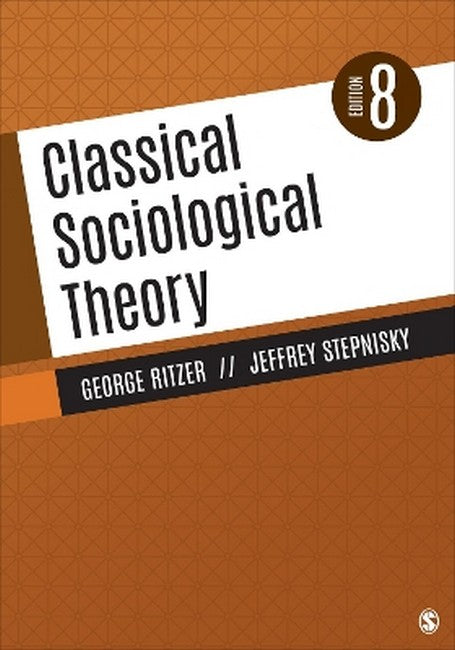George Ritzer is Distinguished University Professor at the University of Maryland, where he has also been a Distinguished Scholar-Teacher and won a Teaching Excellence Award. He was awarded the Distinguished Contributions to Teaching Award by the American Sociological Association, an honorary doctorate from LaTrobe University in Australia, and the Robin Williams Lectureship from the Eastern Sociological Society. His best-known work, The McDonaldization of Society (8th ed.), has been read by hundreds of thousands of students over two decades and translated into over a dozen languages. Ritzer is also the editor of McDonaldization: The Reader; and author of other works of critical sociology related to the McDonaldization thesis, including Enchanting a Disenchanted World, The Globalization of Nothing, Expressing America: A Critique of the Global Credit Card Society, as well as a series best-selling social theory textbooks and Globalization: A Basic Text. He is the Editor of the Encyclopedia of Social Theory (2 vols.), the Encyclopedia of Sociology (11 vols.; 2nd edition forthcoming), the Encyclopedia of Globalization (5 vols.), and is Founding Editor of the Journal of Consumer Culture. In 2016 he will publish the second edition of Essentials of Sociology with SAGE. Jeffrey Stepnisky is an Associate Professor of Sociology at MacEwan University in Alberta, Canada, where he teaches classical and contemporary social theory. He has published in the area of social theory, especially as it relates to questions of subjectivity, in journals such as The Journal for the Theory of Social Behavior and Social Theory & Health. Along with this book he is co-author of Sociological Theory, Classical Sociological Theory, and Modern Sociological Theory, and has co-edited the Wiley-Blackwell Companion to Major Social Theorists, all with George Ritzer.
Request Academic Copy
Please copy the ISBN for submitting review copy form
Description
Preface Acknowledgments About the Authors Part I: Introduction to Classical Sociological Theory Chapter 1: A Historical Sketch of Sociological Theory: The Early Years Introduction Premodern Sociological Theory Social Forces in the Development of Sociological Theory Intellectual Forces and the Rise of Sociological Theory The Development of French Sociology The Development of German Sociology The Origins of British Sociology The Key Figure in Early Italian Sociology Non-European Classical Theory The Contemporary Relevance of Classical Sociological Theory Summary Chapter 2: A Historical Sketch of Sociological Theory: The Later Years Early American Sociological Theory Sociological Theory to Midcentury Sociological Theory from Midcentury Late Twentieth-Century Integrative Theory Theories of Modernity and Postmodernity Social Theory in the Twenty-First Century Summary Part II: Classical Sociological Theory Chapter 3: Alexis de Tocqueville Comparative Study American Politics The Sociology in Tocqueville's Work The Key Sociological Problem(s) Freedom, Democracy, and Socialism Colonialism Contemporary Applications Summary Chapter 4: Auguste Comte Comte's Profound Ambitions Comte's Sociology Theory and Practice Criticisms and Contributions Summary Chapter 5: Herbert Spencer Spencer and Comte General Theoretical Principles Sociology The Evolution of Society Ethics and Politics Criticisms and Contemporary Applications Summary Chapter 6: Karl Marx Introduction The Dialectic Dialectical Method Human Potential The Structures of Capitalist Society Materialist Conception of History Cultural Aspects of Capitalist Society Marx's Economics: A Case Study Communism Criticisms Contemporary Applications Summary Chapter 7: Emile Durkheim Introduction Social Facts The Division of Labor in Society Suicide The Elementary Forms of Religious Life Moral Education and Social Reform Criticisms Contemporary Applications Summary Chapter 8: Max Weber Methodology Substantive Sociology Criticisms Contemporary Applications Summary Chapter 9: Georg Simmel Primary Concerns Individual Consciousness and Individuality Social Interaction ("Association") Social Structures and Worlds Objective Culture The Philosophy of Money Secrecy: A Case Study in Simmel's Sociology Criticisms Contemporary Applications Summary Chapter 10: Early Women Sociologists and Classical Sociological Theory: 1830-1930 Harriet Martineau (1802-1876) Charlotte Perkins Gilman (1860-1935) Jane Addams (1860-1935) and the Chicago Women's School Anna Julia Cooper (1858-1964) and Ida Wells-Barnett (1862-1931) Marianne Schnitger Weber (1870-1954) Beatrice Potter Webb (1858-1943) Contemporary Applications Summary Chapter 11: W. E. B. Du Bois Intellectual Influences Studying Race Scientifically: The Philadelphia Negro Theoretical Contributions Economics Karl Marx, Socialism, and Communism Contemporary Applications Summary Chapter 12: Thorstein Veblen Intellectual Influences Basic Premises Substantive Issues Criticisms and Contemporary Applications Summary Chapter 13: Joseph Schumpeter Creative Destruction Schumpeter's Broader Economic Theory Toward a More Dynamic Theory of the Economy Schumpeter's Sociology The Future Contemporary Applications Summary Chapter 14: Karl Mannheim The Sociology of Knowledge Ideology and Utopia Rationality and the Irrationality of the Times Criticisms and Contemporary Applications Summary Chapter 15: George Herbert Mead Intellectual Roots The Priority of the Social The Act Mental Processes and the Mind Self Society Criticisms and Contemporary Applications Summary Chapter 16: Alfred Schutz The Ideas of Edmund Husserl Science and the Social World Typifications and Recipes The Life-World Intersubjectivity Realms of the Social World Consciousness, Meanings, and Motives Criticisms and Contemporary Applications Summary Chapter 17: Talcott Parsons Parsons's Integrative Efforts General Principles The Action System Change and Dynamism in Parsonsian Theory Criticisms and Contemporary Applications Summary References Name Index Subject Index

